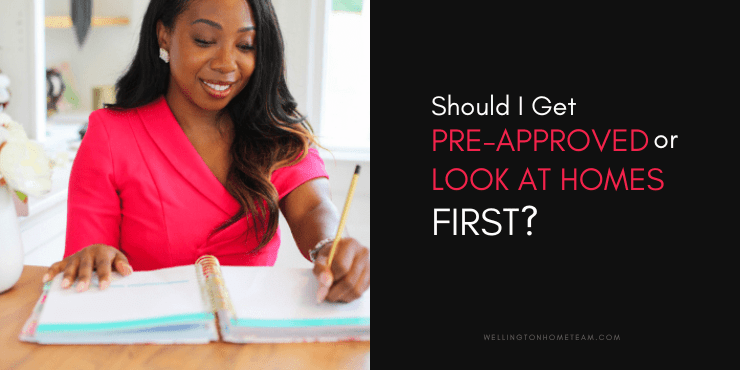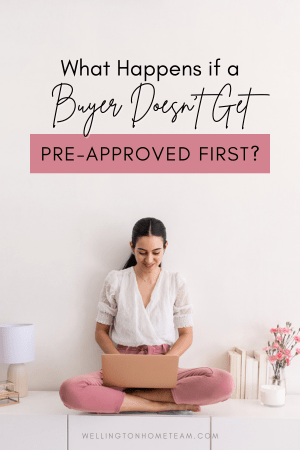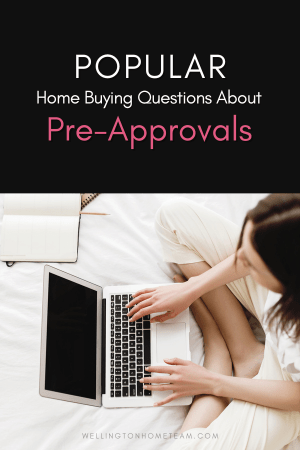Should I Get Pre-Approved or Look at Homes First?
Today a young lady contacted me and wanted to know if I could show her a home listed for sale. During the discussion, I found out she wasn’t paying cash and needed to obtain financing, but wasn’t pre-approved for a mortgage yet. After I explained the importance of getting pre-approved before looking at homes she happily reached out to a lender.

Well, she quickly found out that not only could she not afford the home she wanted to see, but she wasn’t able to qualify for a mortgage. Had I jumped in my car and shown her this home not only would I have wasted my time and her time, but the seller’s and listing agent’s time too. This is one of the many reasons why agents should not show homes for sale to unqualified buyers and why buyers need to be pre-approved before starting their home search.
What Happens if a Buyer Doesn’t Get Pre-Approved First?
The very first step in the home-buying process is getting pre-approved for a mortgage unless the buyer is paying cash. A lot of buyers understand the importance of taking this step but others do not. Some buyers are so confident they’ll get approved for a mortgage they don’t think when they do it really matters. Then there are those who simply don’t know they should be pre-approved prior to starting their home search. If a buyer is not pre-approved before they start looking at homes for sale, whether online, at open houses, or in person there are several possible outcomes, and here are the top 5:
Denial
Buyers get denied and don’t qualify for mortgages every single day. Just because a person has a job, a good income, and a great credit score doesn’t necessarily mean they’ll ever be approved for a loan. There are several factors taken into consideration when a buyer applies for a mortgage. While on paper it may look like they shouldn’t have an issue qualifying that is not always the case.
There are several factors lenders look at when assessing a borrower’s ability to qualify and repay the loan. Having a job and making money is certainly one of them. However, it also matters how long the applicant has worked at that job and how much money they make. Credit is another big factor that is analyzed in addition to the applicant’s debt-to-income ratio, and the amount of money they have saved for a down payment and closing costs.
By assessing these factors, mortgage lenders can determine the applicant’s eligibility and the terms of the loan, if they qualify. Every person’s loan terms, the loan type, loan amount, and interest rate, will be different. So nobody can assume just because their co-worker was approved up to $600,000 for a 30-year fixed conventional mortgage with 10% down that they will be too.
Affordability
Finding out if a prospective buyer is pre-approved for a mortgage is just one piece of the puzzle. The next step is for them to review and understand their pre-approval letter, which will outline the terms they qualify for. This will include the maximum loan amount, loan type, down payment required, and current interest rate. This information plays a crucial role when it comes time to submit an offer on a home because it needs to be part of the offer.
 Once a buyer knows how much they’ve been pre-approved for now they need to determine how much they actually want to spend. Just because a buyer has been pre-approved for $500,000 doesn’t necessarily mean they want to spend that amount.
Once a buyer knows how much they’ve been pre-approved for now they need to determine how much they actually want to spend. Just because a buyer has been pre-approved for $500,000 doesn’t necessarily mean they want to spend that amount.
So now they need to take a closer look at what their estimated monthly expenses would be if they maxed out their pre-approved amount. These expenses should not only include the mortgage itself (principal and interest), but also the estimated property taxes, homeowners insurance, and HOA fees. Sometimes these additional expenses beyond the mortgage can be more than the actual mortgage.
After this information is gathered a buyer will be able to make an informed decision and determine how much they actually want to spend. It may be the maximum amount they were pre-approved for or it could be a portion.
Need Money?
If a home buyer doesn’t have enough money for a down payment and closing costs it is still possible for them to buy a home. That is if the seller is willing to help them out and pay their closing costs. When a seller agrees to contribute towards a buyer’s closing costs it’s called a seller concession or seller contribution.
Now different loan programs may have different limits on how much money a seller can contribute toward a buyer’s closing costs. So the buyer needs to know this amount upfront. Not only do they need to know how much the seller can contribute they need to know how much money they actually need.
Just because a seller can contribute 6% towards a buyer’s closing costs doesn’t necessarily mean a buyer should ask for 6% and here’s why. Let’s say the purchase price of a home is $500,000 and the buyer asks for a 6% seller contribution, which is $30,000. However, the buyer’s closing costs are only $13,000, so what happens with the other $17,000? Well, the seller gets to keep it. So a buyer will be mortgaging an extra $17,000 that they didn’t have to.
Instead, they could have paid $483,000 for the house and asked for roughly 2.5-2.7% in seller concessions. By doing so they wouldn’t be financing more than they needed to and the seller wouldn’t be netting more than they expected. Being pre-approved for a mortgage and knowing this information upfront is crucial.
Stepping Back
When buyers look at homes for sale that are more expensive than what they can be approved for and buy it can be very difficult to start looking at homes they can afford. Falling in love with a 4-bedroom single-family pool home when in reality the buyer can only purchase a 3-bedroom townhome is a huge jump backward.
Once again just because a buyer has a great job, income, and credit doesn’t mean they will get pre-approved for any amount they want. So while a buyer may have determined how much they can afford to spend on a house doesn’t mean the lender will agree and approve them for that amount.
Required with Offers
In this fast-paced market, it is extremely important for buyers to have a pre-approval letter in hand before they start looking at homes for sale. Sellers are not going to accept an offer without a pre-approval letter nor are they likely to wait for a buyer to obtain one especially if they have multiple offers on the table. Plus, how will a buyer know what terms to offer when they’re not pre-approved for a loan? Will they be pre-approved for a conventional loan or an FHA loan? These are specific terms that need to be in the offer.
So while it could only take a few hours for a buyer to obtain a mortgage pre-approval they could lose a home in that amount of time. In addition, top lenders are often busy and can’t necessarily drop what they’re doing to pre-approve a buyer for a loan. Therefore, deciding which lender a buyer is going to use should be done prior to looking at homes.
Final Thoughts
One of the biggest mistakes home buyers make is not getting pre-approved for a mortgage before starting their home search. From getting pre-approval for a mortgage to submitting an offer to having a home inspection to closing there are numerous steps in the home-buying process. Steps that need to be followed in a specific order.
While I completely understand some buyers want to look at homes for sale and “see if they like anything” before getting pre-approved for a loan. However, to avoid wasting time, energy, and possibly heartbreak it’s imperative buyers get pre-approved for a loan before they start their home search.
Please consider spreading the word and sharing; Should I Get Pre-Approved or Look at Homes First?
If you are getting ready to buy a home you might be wondering if you should get pre-approved or look at homes first. This article provides the shocking answer. #realestate #homebuyingPopular Home Buying Questions
How long before buying a house should I get pre-approved for a mortgage? In general, it’s recommended to get a mortgage pre-approval about 3-6 months before you plan on buying a home. This timeframe allows you enough time to gather the required documents, address any potential issues that may arise during the pre-approval process, and explore different mortgage options.
Additionally, getting pre-approved in advance will give you an understanding of your budget and helps streamline the homebuying process. Just keep in mind that the exact timeline may vary depending on your individual circumstances, not everyone needs to get pre-approved that early. Some home highly qualified home buyers can get pre-approved a few days before starting their home search.
 Can you look at houses before pre approval? While technically you may be able to look at houses before receiving a pre-approval letter it’s never advised. As discussed above there is no benefit to looking at houses prior to being pre-approved, only drawbacks.
Can you look at houses before pre approval? While technically you may be able to look at houses before receiving a pre-approval letter it’s never advised. As discussed above there is no benefit to looking at houses prior to being pre-approved, only drawbacks.
What are the chances of getting denied after pre-approval? A mortgage pre-approval is a great indication that a buyer will be approved for a mortgage. However, a lot of things can transpire from when the pre-approval letter was issued to when the file comes out from underwriting.
So there is no guarantee a buyer will receive final approval. The words a buyer wants to hear are “You’re clear to close,” and then it’s pretty much a done deal up until that point anything can happen. With that being said if a buyer’s financial situation remains stable and there are no significant changes, the chances of denial after pre-approval are relatively low.
Can you make an offer on a house before pre approval? Yes, a buyer can certainly make an offer on a house without a pre-approval letter. However, without a pre-approval letter, how will they know what mortgage terms to offer? These terms will include the type of mortgage, mortgaged amount, along with the loan commitment period all of which need to be spelled out in an offer.
Additionally, why would a seller entertain an offer when the buyer doesn’t even know themselves whether or not they can get approved for a mortgage? It would be a huge risk for a seller to accept an offer without a pre-approval letter and in today’s market it just doesn’t happen. A seller is better off waiting for a qualified buyer as opposed to taking their home off the market and possibly having to put it back on.
Why is my Realtor asking for pre approval letter? Realtors ask for pre-approval letters for multiple reasons and here are the top two reasons. One, they want to know if the buyer is actually qualified to buy a home. Two, when submitting an offer they need to know what terms the buyer is qualified to offer. These terms include the max mortgage amount, mortgage type, down payment, and loan commitment period.
About the Author
Top Wellington Realtor, Michelle Gibson, wrote: “Should I Get Pre-Approved or Look at Homes First?”
Michelle has been specializing in residential real estate since 2001 throughout Wellington Florida and the surrounding area. Whether you’re looking to buy, sell, or rent she will guide you through the entire real estate transaction. If you’re ready to put Michelle’s knowledge and expertise to work for you call or e-mail her today.
Areas of service include Wellington, Lake Worth, Royal Palm Beach, Boynton Beach, West Palm Beach, Loxahatchee, Greenacres, and more.

 Michelle Gibson of the Hansen Real Estate Group Inc is a full-time REALTOR who has been specializing in Wellington, Florida real estate since 2001. This veteran of the real estate industry has expertise in technology, marketing, and social media.
Michelle Gibson of the Hansen Real Estate Group Inc is a full-time REALTOR who has been specializing in Wellington, Florida real estate since 2001. This veteran of the real estate industry has expertise in technology, marketing, and social media.